- Home
- Keith R. A. DeCandido
Supernatural 1 - Nevermore
Supernatural 1 - Nevermore Read online
To the late great Scott Muni, for informing so much of the music of my childhood... To John, Jack, Ray, Doug, Kathy, Janyce, Arleen, Kevin, and all the other nutjobs on the paper, Fordham University's alternative paper, who gave me my first great publishing experience... To Edgar Allan Poe, who lived a hard life, but whose groundbreaking work will live on forever... And in general to the Bronx, the place where I was born and live, the place where I grew up, the place where I was educated, and still New York's best kept secret. Boogie down!
I heard all things in the heaven and in the earth. I heard many things in hell.
—Edgar Allan Poe, "The Tell-Tale Heart"
This novel takes place between the second-season Supernatural episodes "Crossroad Blues" and "Croatoan."
ONE
Fordham University
The Bronx, New York
Sunday 12, November 2006
A chill November breeze blew John Soeder's hair into his face, Mother Nature's reminder to get a haircut in the absence of his actual mother being around to nag him about it. She was back in Ohio where it was safe, and also ten degrees colder than it was here in the Bronx. If Emily Soeder could see her son's shaggy mop of brown hair, she'd make that clicking noise she always made and offer to call to make the haircutting appointment herself. John loved attending Fordham University for about a thousand reasons, but its considerable distance from his mother numbered high on that list.
He and his roommate, Kevin Bayer, were heading back to their off-campus apartment after a long day in the print shop in the basement of the McKinley Center. They were the coeditors of Fordham's alternative paper and had spent most of the day putting the latest biweekly issue to bed. The files had been e-mailed to the printer, and they would have the issues by Tuesday morning. That was critical, as they had to get it out before The Ram, Fordham's stodgy official student newspaper, especially because of the exclusive they got from the dean.
They were walking quickly through the campus, heading toward the exit at Belmont Avenue by Faculty Memorial Hall. From there it was only a few blocks to their battered, cluttered, tiny—but blissfully cheap—apartment on Cambreleng Avenue. Once they hit the exit, John brushed his hair out of his face and said, "C'mon, let's motor. I wanna get home and change for the party."
"What party?"
"Amy's party, remember?"
Kevin winced. "I got an eight-thirty class tomorrow morning, dude, I can't."
Shrugging, John said, "Blow it off."
"No way. Dr. Mendez'll have my ass. Seriously, she takes attendance. I already missed three classes 'cause'a production weekends, I can't miss another one."
They had come to the corner of Belmont Avenue and Fordham Road, and had to wait for the light—the traffic was sufficiently heavy, even this late on a Sunday, so they couldn't cross against the light. Prior to senior year, John had lived in the on-campus dorms, which were part of the lush greenery that characterized Fordham's campus, an oasis of academe in the midst of the largest city in the world. Well, not the midst—the Bronx was the northernmost part of New York City, just above Manhattan and Queens, and the only part of the city attached to the mainland. Before visiting Fordham during his senior year of high school, John had always assumed New York to be Manhattan. He had no idea of the outer boroughs, and was thrilled to find himself in a neighborhood that by itself was a more exciting city than Cleveland ever could be.
The transition still messed with his head a little, though. Fordham's campus was all trees and grass and a mix of old and new buildings—some dating back to the university's founding in the nineteenth century, others late twentieth-century additions—and wouldn't have been out of place in a sleepy town somewhere in New England.
But then you stepped through the wrought-iron gates and were hit with a cacophony of cars and buses zipping down Fordham Road—or crawling if it was rush hour—pedestrians, gas stations, fast-food joints, car repair shops, and people. The neighborhood was a mix of Italians who had come in the early twentieth century, Latinos who came in the 1960s, and Albanians who came in the 1980s. Just down the street in one direction was Sears, Fordham Plaza, and the Metro North train; the other way, the Department of Motor Vehicles, the Bronx Zoo, and the Botanical Gardens. The "Little Italy" neighborhood still thrived, filled with delis, wine stores, restaurants, bakeries, pasta shops, and the occasional street fair, and John had gained five pounds that semester just by moving closer to a source of canolis.
Of course, on a late Sunday night, there were almost no people on the street, just the cars. The light changed, and Kevin and John ran across the street, since it was already blinking with the red hand indicating don't walk before they made it halfway.
"Why'd you take a Monday morning class anyhow?" John asked. "You knew you'd be up late most Sundays."
"It was the only medieval lit class I could take. Only other one was opposite the Shakespeare seminar, and that's a two-parter that I gotta take part two of next semester."
They turned to walk up Fordham to Cambreleng. "And you're not taking a medieval lit class next semester, why, exactly?"
"'Cause Dr. Mendez'll be on sabbatical, and that means Father O'Sullivan."
John, who was a history major and therefore had no clue about the English department, scratched his chin—he needed a shave, something else his mother'd be on his ass about were she here—said, "Yeah, and... ?"
Kevin's eyes got wide. "Father O'Sullivan's had tenure since, like, the Dark Ages."
"Middle Ages."
"What?"
"It wasn't the Dark Ages," John said defensively. "They don't call it that anymore, it's called—"
"Dude, the Roman Empire had indoor plumbing. The Holy Roman Empire peed out their windows. It was the Dark Ages."
John gritted his teeth and was about to respond, but Kevin got back to his original topic: "Father O'Sullivan got tenure in, I swear to God, 1946."
They turned onto Cambreleng. "Dude, my father was born in 1946."
"My point. The man's a freakin' fossil. No way am I taking a class with him."
"Whatever." John didn't really care all that much.
"You should still come to the party."
"No way, I need my beauty rest."
John grinned. "Ain't enough sleep in the world to make that happen."
"Bite me entirely, dude."
Another breeze gusted, and John had to push the hair out of his face again. The farther they got from Fordham Road, the quieter it became, as Cambreleng was entirely residential. Most of the block was filled with red brick three-story townhouses that were a few feet in from the street, a postage-stamp front area separated from the sidewalk by a waist-high wrought-iron fence. The rest of the block had five-story apartment buildings. Fewer buildings went higher than that, since once you went above five floors, city law required you put in an elevator. Many of the windows on the block were dark, and John and Kevin were the only people on the sidewalk.
"Well, I'm still going, since I had the brains to arrange a proper schedule, where my first Monday class is at twelve-thirty. Which means, par-tay."
Kevin chuckled. "Dude, Britt's not gonna dump Jack for you."
John tensed up. In fact, hitting on Britt was at the top of his list of things to do at Amy's party, but he saw no reason to share that with his roommate. "Britt's gonna be there?"
"Don't even. You lie like I snowboard."
"You don't snowboard."
"My point."
John started to say Whatever, but he'd already said that, and he hated repeating himself. Kevin may have been fond of that doofy catch phrase "my point," which he used all the damn time, but John liked to be verbally diverse. That was the thing he always nailed in the
articles he edited for the paper—repetition. You kept people interested by saying different things, not by using the same tired phrases. It was why he didn't like most stand-up comics and sketch comedians. They'd get some kind of catch phrase, and then it would become expected and desired, and the routine wouldn't be about being funny anymore, but about building to the catch phrase. That wasn't entertainment, that was conditioning.
"What the hell's that?"
Kevin was pointing at something, and John followed his finger to the plastic garbage cans in front of one of the town houses. It looked like someone was rummaging through the garbage.
Sadly, that wasn't so unusual a sight. There were plenty of homeless people around, and they'd often go through recycling bins to find cans and bottles they could redeem at the supermarket.
Then the figure raised its head, and John saw that it wasn't a homeless guy. They both stopped walking as they realized that it was some sort of simian.
"That's a baboon!" John said.
"Dude, that's an orangutan."
John frowned. "You sure?"
"Pretty sure."
The baboon or orangutan or whatever it was looked over at them, opened its mouth, and hissed.
Both John and Kevin stepped back a pace or two. John whispered, "Dude, do orangutans hiss?"
"No, but I don't think baboons do, either. And why're we whispering?"
Before John could answer that, the—oh, hell, he'd just call it a monkey until he found out for sure—picked up the garbage can and threw it into the street. Unfortunately, the lid was off, so a torn garbage bag came rolling out, spilling rotten food, empty containers, and other stuff onto the pavement. John said, "You got your cell?"
Kevin nodded.
"Good, 'cause my battery's dead."
"Who the hell'm I supposed to call, Lost and Found?"
Not taking his eye off the monkey, John said,
"No, 911, you doof, now call 'em, before—"
Suddenly, the monkey ran toward them, screeching like it was on a meth bender or something. John wanted to turn and run away, but found that he couldn't make his legs move.
And it didn't matter for very long, because this monkey could give Jesse Owens a run for his money. It was on them in a second.
As a general rule, John hated when he screamed. He always sounded like a girl. Proving that this was an unjust universe, his screams actually had gotten higher in pitch after his voice changed. It was embarrassing, really, so whenever he felt the urge to scream, he tried to keep his mouth shut, so it came out as more of a hum. To his mind, that sounded manlier.
But right now, with a crazed monkey screeching and howling and jumping on top of him and Kevin, and hitting them really hard with his big hands, he screamed like a girl.
He hadn't felt like this since he got into that stupid fight in high school with Harry Markum over who would be going to the prom with Jeannie Waite. The joke being, of course, that she went with that loser Morty Johannsen, so he got a black eye and a split lip for nothing. The monkey's fists pounded on him and Kevin both, and the pain was just everywhere.
Then one smack caught him in the side of the head, and he literally saw stars, something he used to think only happened in cartoons.
Only when he felt the cool pavement on his cheek did John realize that the monkey wasn't hitting him anymore. But he still heard screams. Rolling over, which sent a shooting pain through his side, he saw the monkey picking Kevin up and throwing him into the fence in front of one of the town houses.
Then he heard a snap.
He didn't want to believe it. Couldn't believe it at first. It wasn't like a twig breaking, it wasn't like a piece of plastic snapping in two, it wasn't—
It wasn't like anything John Soeder had ever heard before. And because of that, he knew that Kevin was dead.
"No. Kevin!"
He barely noticed the orangutan or baboon or gorilla or whatever it was lumbering toward him. Instead, he just stared at Kevin, lying there on the Cambreleng Avenue sidewalk, his head at an impossible angle, and wondered how the hell this could possibly have happened. It couldn't have been real, monkeys didn't just show up on the street and beat people to death. It couldn't be!
The monkey leapt on top of him then and started whaling on him, and he didn't even raise an arm to defend himself, because he simply couldn't believe it.
The second boy took forever to die.
At least the first one was taken care of quickly. But the other one, the one who kept muttering to himself after the first one died, the orangutan had to keep punching and punching until he finally gave in. Once the second one breathed his last, he spoke the incantation one final time, then stepped on the burning wormwood to put it out. A few charred bits of wormwood leaf were left on the pavement, but the wind would scatter that in due course. And even if they found it, no one was likely to connect it to an escaped orangutan beating two people to death. It wasn't pleasant, but it was necessary—and it had to be done tonight, in the last quarter of the moon, just as the first one had to be done on the full moon on the fifth. True, they discovered the body two days later, which was sooner than he'd expected, but nobody from the constabulary had come to question him, so all his precautions had obviously been successful. More to the point, it had to be done on this spot. The second spot of the sigil had been traced with the appropriate ritual.
Once he was sure the small flame was extinguished, he stepped out from the narrow passageway between one of the town houses and the apartment building—and wasn't it revolting, the way people just tossed their garbage into the dark places, hoping nobody would notice it?—and unholstered the tranquilizer gun. Taking careful aim, he shot the orangutan in the neck.
It fell face first into the pavement a second later. Running onto the sidewalk, he quickly removed the dart with a gloved hand. There would be no trace of his presence here.
Turning, he ran toward his car while pulling out a disposable cell phone he'd bought earlier that afternoon at one of the delis on Arthur Avenue and dialed 911.
"There's some kinda wild animal! Beatin' two kids at Cambreleng an' a hun' eighty-eighth! Come quick!"
Then he tossed the cell phone into a metal mesh garbage can on the corner of East 188th Street and got into his parked vehicle.
Two down, two to go. Then, at last, the answer will be mine!
TWO
Bowles Motel and Lodge
South Bend, Indiana
Wednesday 15, November 2006
"That's the problem with the job, Sammy, sometimes you hit a dead end."
Sam Winchester silently agreed with his brother Dean as they did their final check of the motel room before hauling their stuff out to the car. Their father had drilled into them from a young age always to scour a room before checking out, as it wouldn't do to leave personal stuff lying around. Especially when some of that stuff included exotic weaponry and ancient grimoires. Generally, they were good about cleaning out the room. There was that one time in Key West when Dean had left the tin of salt next to the bed, and he'd insisted on turning the car around on Route 1 and heading back to retrieve it. Sam had asked why they couldn't just go to a supermarket and get another one—it was a pretty common household item, after all—but Dean had insisted that it was the principle of the thing.
Which had been fine right up until the clerk asked why the two brothers had a big tin of salt in their hotel room, and Dean had gotten that wide-eyed look he got when somebody went off the script. With Sam watching and not even bothering to hide his grin, Dean had stammered for about half an hour before coming up with something about lactose intolerance. ("Dude," Sam had said as they went back out to the car, retrieved tin in hand, "you do know that salt has, basically, nothing to do with lactose intolerance, right?" "Thank you, Mr. Wizard," Dean had replied through clenched teeth.) Today, they were checking out and hitting the road, their latest job not having been a job at all. Dean was still talking as they headed out to the car. "But at least we got to see
beautiful downtown South Bend."
"Yeah, real hot spot," Sam muttered as Dean opened the trunk.
"Hey, we go where the jobs take us."
"Or don't. It really was a suicide, Dean. A normal, run-of-the-mill suicide."
Dean shrugged. "It happens." He tossed his bag into the rear of the trunk, rolling it over the boxes of weapons and supplies. Sam did likewise, using only his left hand, as his right was still in a cast from when that zombie girl broke it back in Lawrence.
Sam didn't have the same attachment Dean did to the black 1967 Chevrolet Impala, the family car their father had passed on to Dean. (Then again, Sam sometimes thought he didn't have the same attachment to his late girlfriend Jessica that Dean had to the Impala.) When the car was wrecked a couple of months back, Dean had rebuilt it pretty much from scratch, a process that took weeks of backbreaking effort.
However, even Sam had to admit that the massive trunk was a great benefit, given that they lived their entire life out of this car. The rear of the voluminous trunk was taken up with three bags: Sam's bag, Dean's bag, and the laundry bag. That last one was starting to bulge.
"We're gonna need to do a laundry run soon, man," Sam said.
"Not here," Dean said quickly. "I don't think that cop was too thrilled with ace reporters Anderson and Barre. We'd better split before he decides to run my face through his computer."
Sam nodded in agreement. Dean was still wanted for a series of murders committed by a shapeshifter taking his form in St. Louis earlier that year, and there was just no way "a mutated freak who looked just like me did it" was going to fly with the U.S. Attorney's Office.
Dean closed the trunk and they headed to the main office. Like most of the places the Winchesters stayed, the Bowles Motel and Lodge was dirt-cheap with minimal amenities. All they needed was a roof, a bed, and a working shower—though the latter was hit and miss with some of the places they stayed—and they weren't exactly rolling in dough. Fighting demons and monsters and things that went booga-booga in the night was important, but it didn't pay. They lived off credit card fraud, and Dean's pool and poker winnings. That meant the Hyatt was not an option.

 Alien
Alien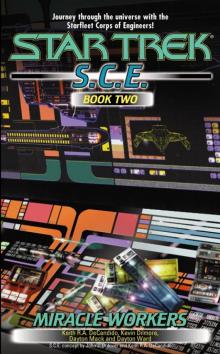 Miracle Workers
Miracle Workers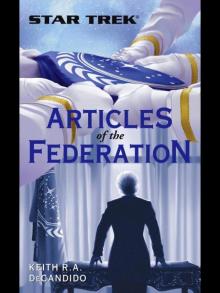 Articles of the Federation
Articles of the Federation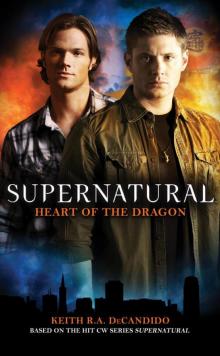 Supernatural Heart of the Dragon
Supernatural Heart of the Dragon War Stories: Book Two
War Stories: Book Two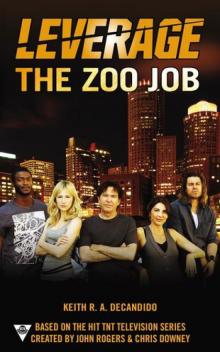 The Zoo Job
The Zoo Job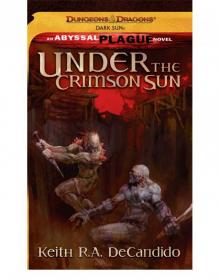 Under the Crimson Sun
Under the Crimson Sun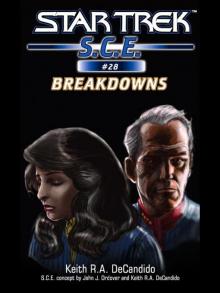 Breakdowns
Breakdowns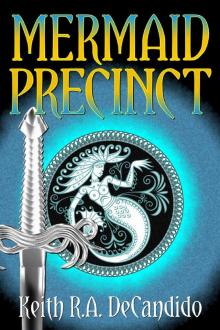 Mermaid Precinct (ARC)
Mermaid Precinct (ARC)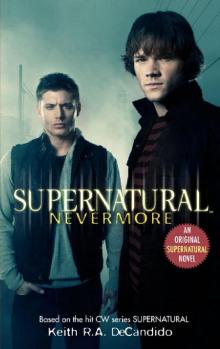 Supernatural 1 - Nevermore
Supernatural 1 - Nevermore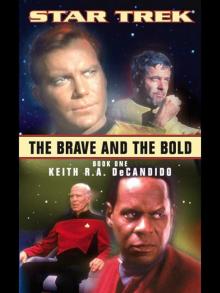 STAR TREK - The Brave and the Bold Book One
STAR TREK - The Brave and the Bold Book One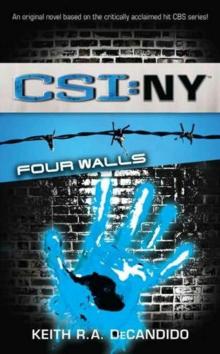 Four Walls
Four Walls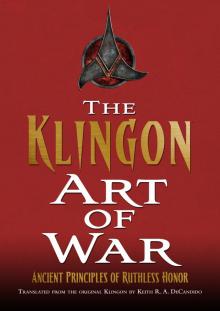 The Klingon Art of War
The Klingon Art of War Blackout
Blackout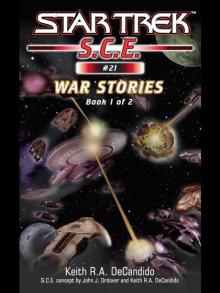 War Stories: Book One
War Stories: Book One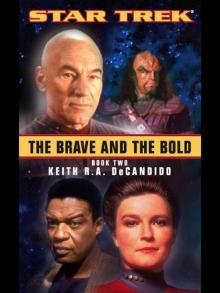 The Brave and the Bold Book Two
The Brave and the Bold Book Two Honor Bound
Honor Bound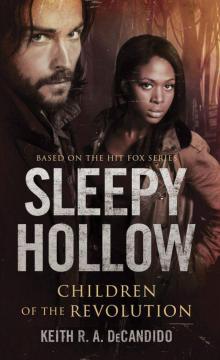 Sleepy Hollow: Children of the Revolution
Sleepy Hollow: Children of the Revolution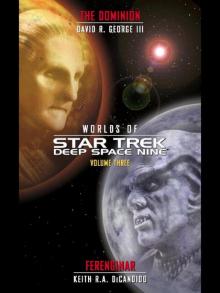 Worlds of Star Trek Deep Space Nine® Volume Three
Worlds of Star Trek Deep Space Nine® Volume Three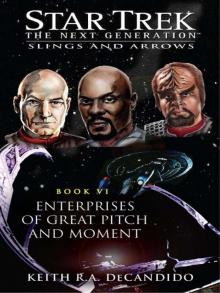 Star Trek: TNG: Enterprises of Great Pitch and Moment
Star Trek: TNG: Enterprises of Great Pitch and Moment Genesis
Genesis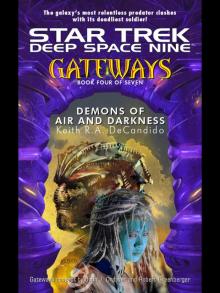 Demons of Air and Darkness
Demons of Air and Darkness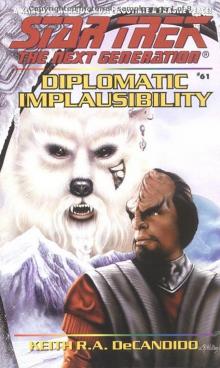 Star Trek - TNG - 61 - Diplomatic Implausibility
Star Trek - TNG - 61 - Diplomatic Implausibility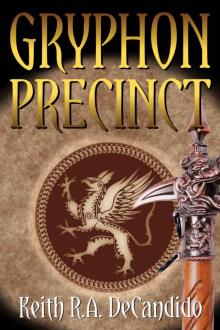 Gryphon Precinct (Dragon Precinct)
Gryphon Precinct (Dragon Precinct)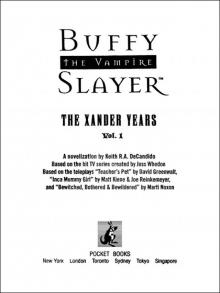 THE XANDER YEARS, Vol. 1
THE XANDER YEARS, Vol. 1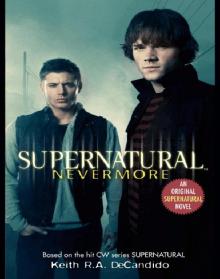 Nevermore
Nevermore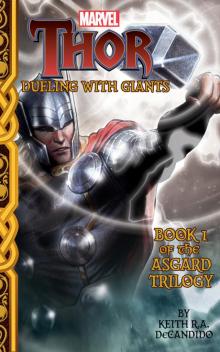 Thor
Thor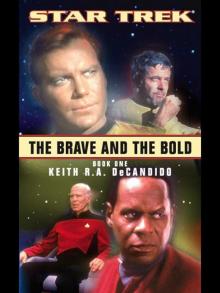 The Brave And The Bold Book One
The Brave And The Bold Book One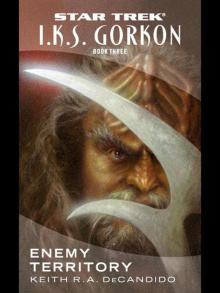 I.K.S. Gorkon Book Three
I.K.S. Gorkon Book Three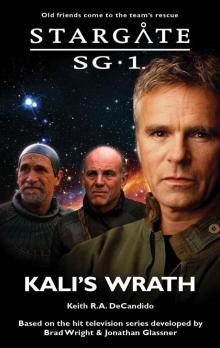 STARGATE SG-1: Kali's Wrath (SG1-28)
STARGATE SG-1: Kali's Wrath (SG1-28)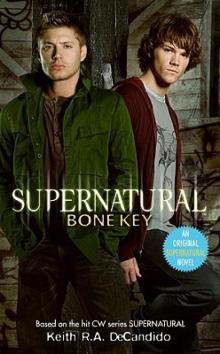 Bone Key
Bone Key Guilt in Innocece
Guilt in Innocece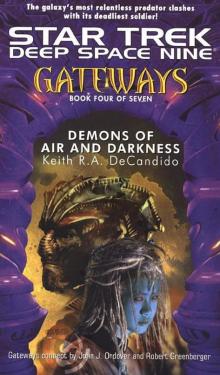 Star Trek - DS9 Relaunch 04 - Gateways - 4 of 7 - Demons Of Air And Darkness
Star Trek - DS9 Relaunch 04 - Gateways - 4 of 7 - Demons Of Air And Darkness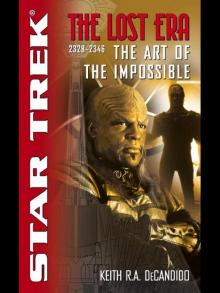 The Art of the Impossible
The Art of the Impossible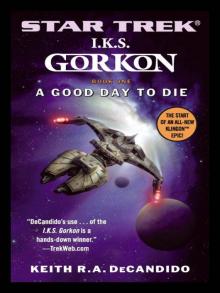 I.K.S. Gorkon Book One: A Good Day to Die
I.K.S. Gorkon Book One: A Good Day to Die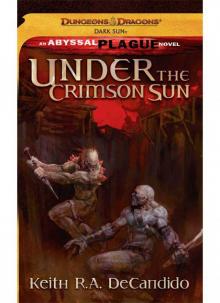 Under the Crimson Sun (the abyssal plague)
Under the Crimson Sun (the abyssal plague)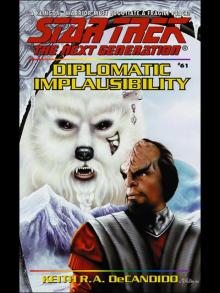 DIPLOMATIC IMPLAUSIBILITY
DIPLOMATIC IMPLAUSIBILITY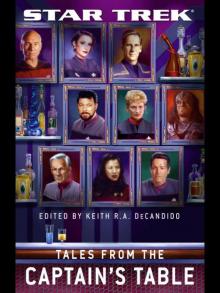 Tales from the Captain's Table
Tales from the Captain's Table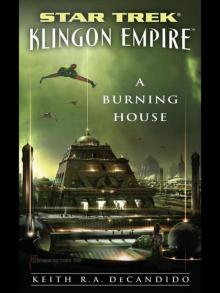 A Burning House
A Burning House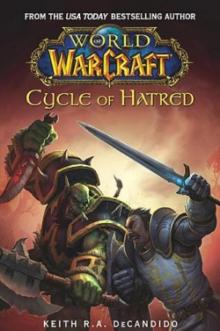 Cycle of Hatred (world of warcraft)
Cycle of Hatred (world of warcraft)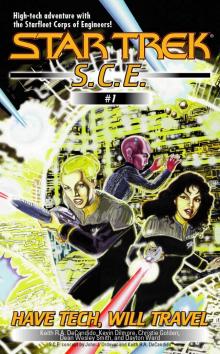 Have Tech, Will Travel
Have Tech, Will Travel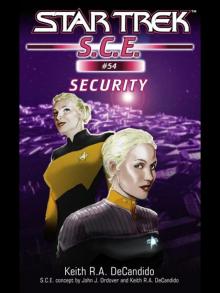 Security
Security